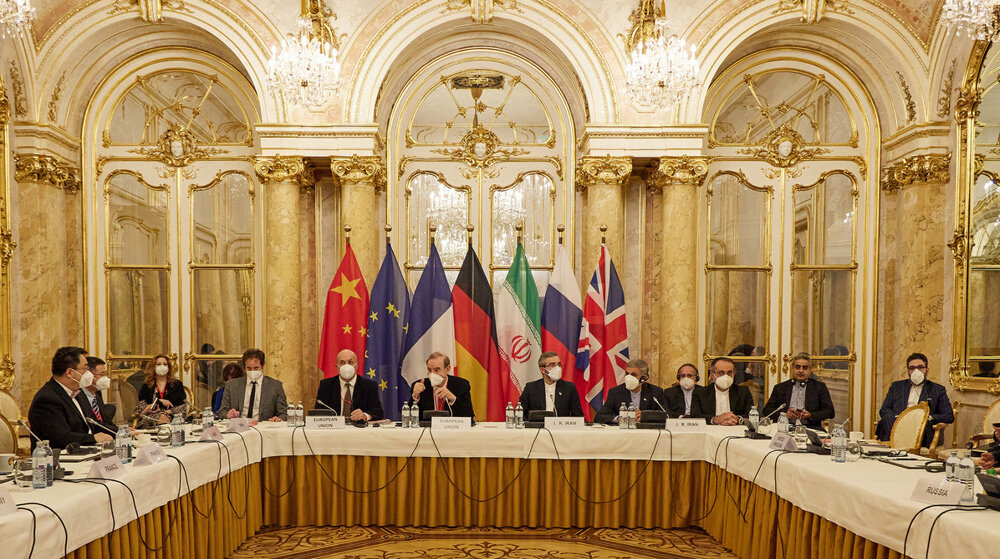Agreement in Vienna at hand only if the West shows the will

TEHRAN – The latest round of Vienna talks came to an end on Friday with Iran underlining progress made in Vienna and the western side cautiously voicing optimism about the road ahead.
The Joint Commission of the Joint Comprehensive Plan of Action (JCPOA) was held at the luxurious Palais Coburg hotel in Vienna on Friday evening, marking the end of nearly three weeks of painstaking negotiations over how to lift U.S. sanctions on Iran.
The current round of talks began on November 29 after a five-month hiatus and continued for three weeks with a week-long interval happening in the middle of the talks.
Before the resumption of the negotiations, the western side launched a concerted media campaign to set the stage for a one-sided negotiation. To this end, they accused Iran of not being serious, and when Iran’s seriousness became clear through two draft proposals on sanctions- and nuclear-related measures, they portrayed Iran’s position as maximalist and unrealistic.
In reality, however, it was the European positions that were maximalist and far-fetched. The Europeans presented demands that fall beyond the scope of the JCPOA. In other words, they came to Vienna not to revive the JCPOA of 2015 but to reach the JCPOA of 2021.
In contrast, Iran fiercely tried to limit the scope of negotiations to only reviving the original JCPOA without any addition or deduction. Iran’s twofold proposal was drafted in strict conformity with the terms of the JCPOA and had nothing to do with non-nuclear issues.
At first, the Europeans rejected the Iranian proposal outright. But when they failed to get Iran budged, they agreed to take into consideration the Iranian drafts.
After the end of the current round, the European Union deputy foreign policy chief, Enrique Mora, said parties to the Vienna talks now somehow have a “common base” on the removal of sanctions, suggesting that the Iranian viewpoints have been incorporated into the new document reached at the end of the talks.
“Now we have a common basis though not entirely there on sanctions lifting chapter but that bit has a different internal logic so no big deal. Hope that clarifies why next is 8,” Mora tweeted on Saturday.
Iran’s chief negotiator, Ali Bagheri Kani, confirmed this in remarks right after the end of the talks on Friday. He said the three European parties to the 2015 nuclear deal, also known as the E3, intimately agreed to accept Tehran’s viewpoint as a basis for “serious, result-oriented” talks, according to Press TV.
Bagheri Kani said Iran and the P4+1 group of countries reached “two new documents for talks both on the issue of sanctions and on the nuclear issue.”
During the talks, Iran showed a number of goodwill measures most notably of which was allowing the International Atomic Energy Agency (IAEA) to install surveillance cameras at a centrifuge manufacturing facility in Karaj. The decision put an end to a months-long grumbling by the IAEA and streamlined the Vienna negotiations.
In addition, Iran announced that its proposals are mere drafts subject to negotiations, a move that paved the way for more business-like interactions in Vienna.
Iran’s constructive positions, however, were met with European stonewalling and blame game. At the end of the latest round, the Europeans sought to downplay the progress made and upped the ante by underlining that time is running out for reaching a deal with Iran.
“There has been some technical progress in the last 24 hours, but this only takes us back nearer to where the talks stood in June,” the E3 negotiators said in a statement, describing the break as “a disappointing pause in negotiations.”
“We hope that Iran is in a position to resume the talks quickly, and to engage constructively so that talks can move at a faster pace,” the European statement added. “There are weeks not months before the JCPOA’s core non-proliferation benefits are lost. We are rapidly reaching the end of the road for this negotiation.”
The next round is expected to be held later this month. Some parties expressed hope that it would be the last round. Iran, for its part, did not rule out the possibility that the next round would be the last one depending on the western parties showing the will to reach an agreement with Iran.
Bagheri Kani said the pace of reaching an agreement depends on the will of the opposite side, adding, “If the other side accepts the rational views and positions of the Islamic Republic of Iran, the new round of talks can be the last one and we can achieve a deal in the shortest possible time.”
Leave a Comment